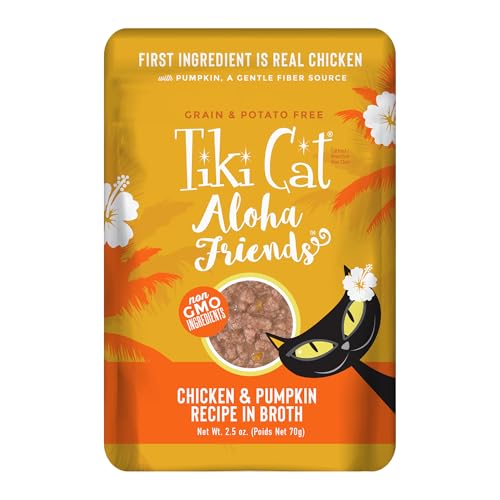Can Cats Eat Butternut Squash?
If you’re a cat lover like me, you might find yourself wondering if your feline friend can enjoy some butternut squash. Well, the answer is yes, cats can eat butternut squash, but there are a few things you should keep in mind.
1. Nutritional Benefits
Butternut squash is packed with important nutrients that can be beneficial for cats. It contains vitamins A, C, and E, which are great for their immune system. It also has fiber that can help with digestion and potassium for maintaining a healthy heart.
2. Moderation is Key
While butternut squash can be a healthy addition to your cat’s diet, moderation is crucial. Cats are obligate carnivores, which means their bodies are designed to thrive on a meat-based diet. Too much butternut squash can upset their stomach and potentially lead to digestive issues.
3. Preparing Butternut Squash for Cats
Before feeding your cat butternut squash, make sure to cook it thoroughly. Raw or undercooked squash can be difficult for your cat to digest. Remove the skin and seeds, as they can be a choking hazard. You can steam or boil the squash until it becomes soft and easy to mash.
4. Watch for Allergic Reactions
Just like humans, cats can have food allergies. When introducing butternut squash to your cat for the first time, watch out for any signs of allergic reactions such as vomiting, diarrhea, or itching. If you notice any of these symptoms, consult your veterinarian immediately.
5. Consult Your Vet
As a cat lover, you always want the best for your furry friend. Consulting your veterinarian before introducing any new food, including butternut squash, is highly recommended. They can provide guidance based on your cat’s specific needs and health conditions.
Remember, butternut squash should never replace a balanced and cat-specific diet. It should only be given as an occasional treat or as part of a well-rounded meal plan. Ensure your cat’s overall diet is centered on high-quality cat food that meets all their nutritional requirements.
The Importance of a Balanced Diet for Cats
As a cat lover, you want the best for your furry friend. You know that their health and well-being depend on a balanced diet. Just like humans, cats require a variety of nutrients to thrive and stay healthy. This is why the right kind of cat food is crucial to their overall nutrition.
- Vital Nutrients: Cats need essential nutrients like proteins, vitamins, and minerals to support their growth, development, and bodily functions. These nutrients provide them with the energy they need to stay active and maintain a healthy weight.
- Proper Growth: Kittens especially need a well-balanced diet to support their rapid growth and development. Adequate amounts of proteins, vitamins, and minerals help with bone and muscle development, ensuring they grow into strong and healthy adult cats.
- Healthy Skin and Coat: A balanced diet promotes a healthy skin and a shiny, lustrous coat. Nutrients like omega-3 and omega-6 fatty acids help nourish their skin and keep their coat soft and glossy.
- Strong Immune System: A well-balanced diet helps boost your cat’s immune system. Nutrients like antioxidants and vitamins help fight off infections and keep them healthy and protected.
- Oral Health: Cat food that provides the right balance of nutrients promotes good oral health. It helps prevent dental issues like plaque and tartar buildup, gum diseases, and bad breath.
Remember, while it may be tempting to introduce new foods, like butternut squash, to your cat’s diet, it is important to consult with your veterinarian first. They can guide you on the appropriate diet for your cat’s specific needs.
A balanced diet is the foundation for your cat’s health and happiness. By ensuring they receive the right nutrients, you are helping them live a long and vibrant life. So, make sure you choose cat food that meets their nutritional requirements and consult your veterinarian for personalized advice.
Keep in mind that a balanced diet is just one piece of the puzzle. Regular exercise, mental stimulation, and proper veterinary care should also be part of your cat’s overall well-being.
Understanding Your Cat’s Digestive System
You may wonder how your furry friend’s digestive system works. Understanding how your cat digests food can help you make informed decisions about what to feed them. Here’s a brief overview of your cat’s digestive system:
- Mouth: The digestion process begins in the mouth. Cats have sharp teeth designed to tear and chew their food. They use their tongues to move the food around and form it into a small ball (known as a bolus) before swallowing it.
- Esophagus: After swallowing, the bolus travels down the esophagus to reach the stomach. The esophagus is a muscular tube that pushes the food downward using rhythmic contractions.
- Stomach: In the stomach, the food mixes with digestive juices, breaking it down further. The stomach secretes stomach acid to sterilize the food and enzymes to start the process of breaking down proteins.
- Small Intestine: The partially digested food then moves into the small intestine, where the majority of nutrient absorption occurs. The small intestine releases enzymes to break down carbohydrates, proteins, and fats more completely.
- Large Intestine: The remaining undigested material enters the large intestine, where water and electrolytes are absorbed. The large intestine also houses beneficial bacteria that aid in digestion.
- Rectum: Finally, the waste material, known as feces, is stored in the rectum until it is eliminated during bowel movements.
While cats have efficient digestive systems, not all human food is suitable for them. So, can cats eat butternut squash? Before introducing any new food into your cat’s diet, remember:
- Consult with your veterinarian to ensure the food is safe for your cat.
- Introduce new foods gradually, allowing their digestive system to adjust.
- Monitor your cat for any adverse reactions or digestive upset.
Remember, a well-balanced cat food that meets their nutritional needs is the best choice for your feline friend. Understanding their digestive system helps you provide the right nutrition for their overall health and well-being.
Potential Benefits of Butternut Squash for Cats
As a cat lover, you want to ensure that your furry friend gets the best nutrition possible. While cats are obligate carnivores, meaning their diet should primarily consist of meat, introducing small amounts of certain fruits and vegetables can provide additional benefits. One such vegetable is butternut squash, which can offer some potential advantages for your feline companion.
- Fiber Boost: Butternut squash is rich in fiber, which can aid in maintaining a healthy digestive system for your cat. The insoluble fiber in butternut squash helps move waste through the intestines, preventing constipation and ensuring regular bowel movements.
- Nutrient Powerhouse: This tasty vegetable is loaded with essential vitamins and minerals. Butternut squash is particularly high in vitamin A and C, which are crucial for maintaining a strong immune system in your cat. These vitamins also promote healthy skin and a shiny coat, making your feline friend look and feel their best.
- Hydration Support: Cats are notorious for being picky drinkers, often preferring not to consume enough water on their own. Butternut squash has a high water content, which can contribute to your cat’s overall hydration. Adequate hydration is vital for proper kidney function and can help prevent urinary tract issues, a common concern for many cats.
- Weight Management: If your cat needs to shed a few extra pounds, incorporating butternut squash into their diet might be a good option. This vegetable is low in calories and fat, while still providing a satisfying and filling addition to their meals. The fiber content can also contribute to a feeling of fullness, reducing the likelihood of overeating.
Remember, even though butternut squash can offer potential benefits for your cat, it should always be served in moderation. As with any changes to your cat’s diet, consult with your veterinarian to determine the appropriate amount and ensure it aligns with your cat’s specific dietary needs.
With the potential advantages of butternut squash, you can offer your cat a diverse range of flavors and nutrients while still prioritizing their carnivorous nature. Variety is key in a cat’s diet, so why not add a little butternut squash goodness to the mix?
Risks and Considerations of Feeding Butternut Squash to Cats
As a cat lover, you may be tempted to share your favorite foods with your furry friend, including butternut squash. While this delicious vegetable is packed with nutrients, it’s important to know the risks and considerations before adding it to your cat’s diet.
First and foremost, it is essential to consult with your veterinarian before introducing any new food to your cat, including butternut squash. Every cat is unique, and what works for one may not work for another. Your vet can provide guidance specific to your cat’s individual needs and health.
One important consideration is the digestive system of cats. Cats have a specialized digestive system that is designed for a meat-based diet. While butternut squash can provide some benefits, it should never replace your cat’s main source of protein. Protein is crucial for your cat’s overall health and well-being, and insufficient intake can lead to nutritional imbalances.
Another factor to consider is the potential for allergies or sensitivities. Just like humans, cats can have food allergies or sensitivities to certain ingredients. While butternut squash is generally well-tolerated by most cats, there is still a small chance that your cat may have a negative reaction. Monitor your cat closely for any signs of digestive upset, such as vomiting or diarrhea, after introducing butternut squash.
It’s also important to note that butternut squash should be prepared properly before serving it to your cat. Remove the skin, seeds, and any seasoning or spices, as these can be harmful to your feline friend. Boiling or steaming the butternut squash until it is soft and mashable is the best way to prepare it for your cat.
While butternut squash can offer some benefits to your cat, such as fiber for a healthy digestive system and vitamins for a strong immune system, it’s crucial to consider the risks and consult with your veterinarian. Remember to introduce butternut squash in small amounts and monitor your cat for any adverse reactions. Your vet will provide the best advice for your cat’s specific dietary needs. Keep your furry friend’s health and well-being a top priority when making dietary decisions.
Conclusion
Before introducing butternut squash to your cat’s diet, it’s important to consult with a veterinarian. Each cat is unique and may have different dietary needs, so it’s crucial to get professional advice. While butternut squash can be a healthy addition to a cat’s diet, it should never replace the essential protein they need.
It’s also important to be aware of any potential allergies or sensitivities your cat may have. Monitor your cat closely for any signs of digestive upset after introducing butternut squash. If you notice any adverse reactions, it’s best to discontinue feeding it to your cat.
When preparing butternut squash for your cat, make sure it is properly cooked and mashed to ensure easy digestion. Remember, moderation is key, and butternut squash should only be given as an occasional treat.
Always prioritize your cat’s health and well-being by seeking professional advice and monitoring their response to new foods. Your veterinarian can provide specific dietary recommendations based on your cat’s individual needs.
Frequently Asked Questions
Q: Is it safe to feed butternut squash to cats?
A: Feeding butternut squash to cats can be safe, but it’s important to consult with a veterinarian. Every cat has different dietary needs, and a vet can provide specific advice. It’s also crucial not to replace protein with butternut squash in a cat’s diet.
Q: Are there any risks or considerations when feeding butternut squash to cats?
A: Yes, there are a few risks and considerations. Cats may have allergies or sensitivities to butternut squash, so it’s important to monitor them for any signs of digestive upset. Additionally, butternut squash should be properly prepared before feeding it to cats.
Q: Should I consult a veterinarian before introducing butternut squash to my cat’s diet?
A: Absolutely! It’s always recommended to consult with a veterinarian before introducing any new food to a cat’s diet. They can provide guidance based on your cat’s specific dietary needs and ensure that butternut squash is a safe choice for them.

















